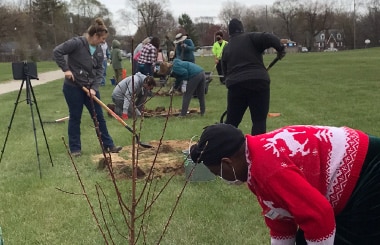Trees: Silent Heroes Safeguarding Our Waterways
Protecting natural areas, such as forested land, is one of the best ways to protect the Huron River and its creeks. Most residents in the Huron River watershed get their drinking water from the Huron River and groundwater from within its boundaries.
Because of this, forests are much more than great places for mindful breaks from a busy day. They are fundamentally connected to the river’s health:

- Trees soak up polluted stormwater with their roots and catch rainwater in their canopies and bark. This slows down the amount of water rushing into creeks, which prevents erosion and sedimentation issues. Depending on the size and species, a single tree can store 100 gallons or more of rainwater!
- Trees filter pollution such as pesticides, fertilizers, and animal waste from runoff.
- When planted near water, trees shade the river and its streams, keeping them cool. Many fish and other aquatic wildlife need cooler water to survive.
- Trees provide habitat for wildlife. This supports a balanced ecosystem.
About this Project
The Forest Stewardship Program at the Michigan Department of Natural Resources (DNR) is leading a team of a dozen conservation partners on a new project called “Forest to Mi Faucet” to educate woodland owners and the public about the connections between forests and drinking water. The project is funded by the USDA Forest Service and builds on its national Forests to Faucets 2.0 spatial analysis of priority watersheds for protecting surface drinking water in the United States. HRWC is one of the conservation partners.
Through this project, HRWC will:
- Create a spatial data set of natural lands and urban tree canopy cover that provides ecosystem services values for water quality and climate resilience for the Huron River watershed area
- Identify high priority properties for protection and/or improved forest management
- Maintenance and planting workshops for forested property owners
- Field assessments for landowners (10+ acre minimum lots)
- Toolkit of land protection options
- Framework for payment for drinking water ecosystem services by municipal water utilities and other entities to forested property owners identified through our Natural Areas Assessment and Protection Program
- Three tree planting or tree distribution events.
In 1997, New York City spent $1.5 billion to preserve the forested watershed that supplies New York City’s drinking water by purchasing thousands of upstate acres of forested watershed. A filtration plant large enough to clean New York City’s water supply would have cost more than $6 billion dollars.” -Arbor Day Foundation/Ecosystem Marketplace
To get our email announcements for all of our events, please sign up to get our enews
Past Events
Lodi Township landowners workshop, “How to Assess, Manage, and Preserve Your Land” (December 11, 2023)
Tree Planting, Gunnar Mettala Park, Wixom (October 28, 2023)
HRWC staff and volunteers planted trees in a park near one of HRWC’s bioswale sites that was installed this year.
Tree Planting, Dexter (October 14)
In partnership with ReLeaf Michigan and the City of Dexter
Sharon Township Landowner Community Meeting (January 18, 2023)
Northfield Township Landowners Workshop (October 3, 2022)
Tree Planting in Ypsilanti Township’s Appleridge Park (April 30, 2022)
April 2022, community groups and volunteers planted 25 fruit and nut trees. The Washtenaw County Conservation District partnered with ReLeaf Michigan, Willow Run Acres, and HRWC on this project.
Non-industrial private forestland encompasses 11 million acres of Michigan – 57% of Michigan’s forested land base – owned by over 420,000 family forest landowners.” -Michigan Association of Conservation Districts




